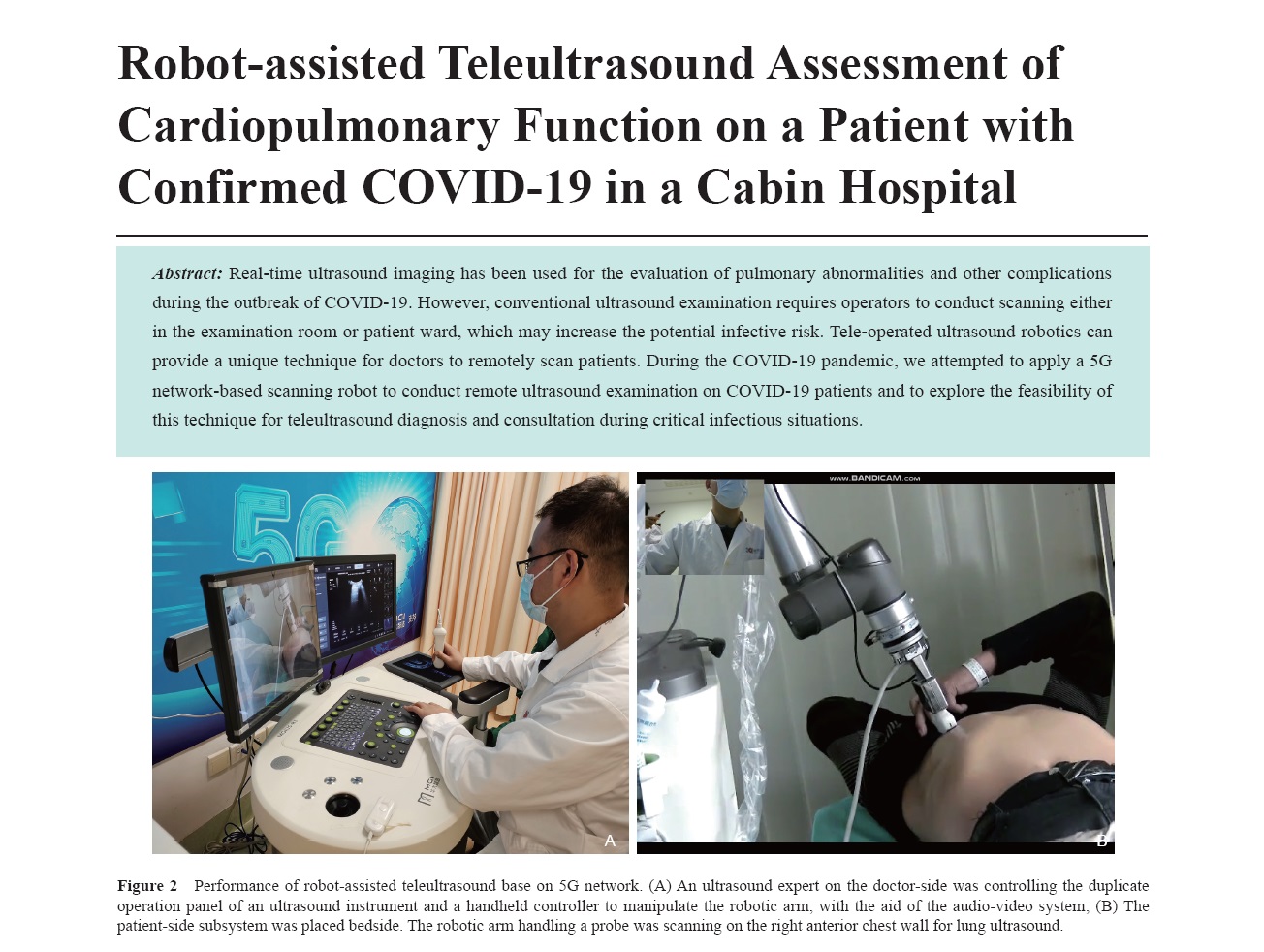

ADVANCED ULTRASOUND IN DIAGNOSIS AND THERAPY >
Robot-assisted Teleultrasound Assessment of Cardiopulmonary Function on a Patient with Confirmed COVID-19 in a Cabin Hospital
Received date: 2020-04-01
Online published: 2020-04-23
Real-time ultrasound imaging has been used for the evaluation of pulmonary abnormalities and other complications during the outbreak of COVID-19. However, conventional ultrasound examination requires operators to conduct scanning either in the examination room or patient ward, which may increase the potential infective risk. Tele-operated ultrasound robotics can provide a unique technique for doctors to remotely scan patients. During the COVID-19 pandemic, we attempted to apply a 5G network-based scanning robot to conduct remote ultrasound examination on COVID-19 patients and to explore the feasibility of this technique for teleultrasound diagnosis and consultation during critical infectious situations.

Key words: Robot-assisted; Teleultrasound; COVID-19; Pulmonary; Cardiac; Ultrasound
Wu, MD Shengzheng , Li, MD Keyan , Ye, MD Ruizhong , Lu, MD Yuehua , Xu, MD Jufen , Xiong, MD Linfei , Cui, MD Ailin , Li, MD Yaqing , Peng, MD Chengzhong , Lv, MD Faqin . Robot-assisted Teleultrasound Assessment of Cardiopulmonary Function on a Patient with Confirmed COVID-19 in a Cabin Hospital[J]. ADVANCED ULTRASOUND IN DIAGNOSIS AND THERAPY, 2020 , 4(2) : 128 -130 . DOI: 10.37015/AUDT.2020.200023
| [1] | Soummer A, Perbet S, Brisson H, Arbelot C, Constantin JM, Lu Q, et al. Ultrasound assessment of lung aeration loss during a successful weaning trial predicts postextubation distress. Crit Care Med 2012; 40:2064-2072. |
| [2] | National Health Commission of the people’s Republic of China. Diagnosis and treatment of novel coronavirus pneumonia (trial, the seventh version) [EB/OL]. ( 2020- 03- 03) [2020-03-04]. Available from: http://www.nhc.gov.cn/yzygj/s7653p/202003/46c9294a7dfe4cef80dc7f5912eb1989.shtml. |
| [3] | Chavez MA, Shams N, Ellington LE, Naithani N, Gilman RH, Steinhoff MC, et al. Lung ultrasound for the diagnosis of pneumonia in adults: a systematic review and meta-analysis. Respir Res 2014, 15:50. |
| [4] | Volpicelli G, Elbarbary M, Blaivas M, Lichtenstein DA, Mathis G, Kirkpatrick AW, et al. International evidence-based recommendations for point-of-care lung ultrasound. Intensive Care Med 2012; 38:577-591. |
| [5] | Viarasilpa T, Panyavachiraporn N, Marashi SM, Van Harn M, Kowalski RG, Mayer SA. Prediction of Symptomatic Venous Thromboembolism in Critically Ill Patients: The ICU-Venous Thromboembolism Score. Crit Care Med 2020. |
| [6] | Ferreira AC, O'Mahony E, Oliani AH, Araujo Júnior E, da Silva Costa F. Teleultrasound: Historical Perspective and Clinical Application. Int J Telemed Appl 2015: 1-11. |
| [7] | Varga P, Peto J, Franko A, Balla D, Haja D, Janky F, et al. 5G support for Industrial IoT Applications-Challenges, Solutions, and Research gaps. Sensors (Basel) 2020.20.pii: E828. |
/
| 〈 |
|
〉 |